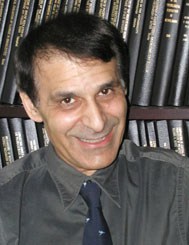 Dr. Edward J.N. Ishac, Professor, Pharmacology and Toxicology
Dr. Edward J.N. Ishac, Professor, Pharmacology and Toxicology
”Lecture capture is a supplement, not a replacement, for the teacher”
One of the nation’s top universities for sponsored research, Virginia Commonwealth University (VCU) enrolls more than 32,000 students at its two campuses in Richmond, satellite locations throughout Virginia and a campus in Doha, Qatar. Its prestigious health science schools and clinical operations of the VCU Health System comprise the VCU Medical Center.
VCU created its Center for Teaching Excellence (CTE) to strengthen faculty development and in turn, enhance student learning. CTE brought instructors together to discuss the school’s successful track record with Echo360’s lecture capture technology. Professors from the medical and nursing schools spoke about their real-world experiences – how they use it, what students think and the challenges involved.
School of Medicine
Dr. Edward Ishac, Professor of Pharmacology & Toxicology and Medical Pharmacology Course Director, has been using lecture capture for over four years. The sweet spot for him is reinforcement of key principles. Echo360 allows him to transport complex topics that students struggle to understand in a traditional classroom lecture into a medium they use on a daily basis and do like. Then they can pause and review the concept again for maximum retention. Some of his students have long commutes, and they can review the audio component of their lectures in the car. The benefits are outstanding.
What about attendance? Won’t students just stop coming to class if they can watch the lecture later? Attendance is not compulsory in Dr. Ishac’s class, and yet he has not seen a drop. It is up to the professor to make the classroom experience an environment that supports creativity and encourages critical thinking, and to use the technology in a way that enhances personal teaching style. And it’s worked. “Lecture capture is a supplement, not a replacement, for the teacher,” says Dr. Ishac.
The medical school creates four or five captures a day and posts them to a proprietary system for student access. Instructors typically find the technology very user-friendly. Ishac says, “With Echo360, the recording will start and stop, and you don’t need to know anything about the technology.” Faculty members are encouraged to participate but have the option to opt out. However, the instant success of Echo360 has made not recording lectures an unpopular choice with the students. During the 2008/09 academic year faculty use was over 90% and this year it is anticipated that usage will be almost 100%.
Here and Now
VCU has an impressive list of groups doing lecture capture – pharmacy, nursing, medical, engineering and business. Success stories like those of Dr. Ishac are helping their peers learn the technology and overcome the misconception that lecture capture will replace faculty. The learning environment is dynamic, with content that changes from year to year. Lecture capture simply reinforces that and allows students to review the material in more detail and a greater depth.
Technology Services
VCU Technology Services is responsible for implementing and supporting the technology used around campus. Today, Technology Services supports Echo360 capturing in several schools and departments and hopes to bring on more. Not only does the group support the storage and delivery of the captures, but it often brings support staff together in order to learn and share how Echo360 and other technologies are used in programs across campus. “Technology Services is committed to bringing technologies to campus that will be creative, innovative and add value to University activities, especially instruction and research,” says Mark D. Willis, Chief Information Officer. “Echo360 advances our responsibilities for delivering high quality products and services to the faculty, staff and students of VCU.”
Echo360.com ‘Live and learn’